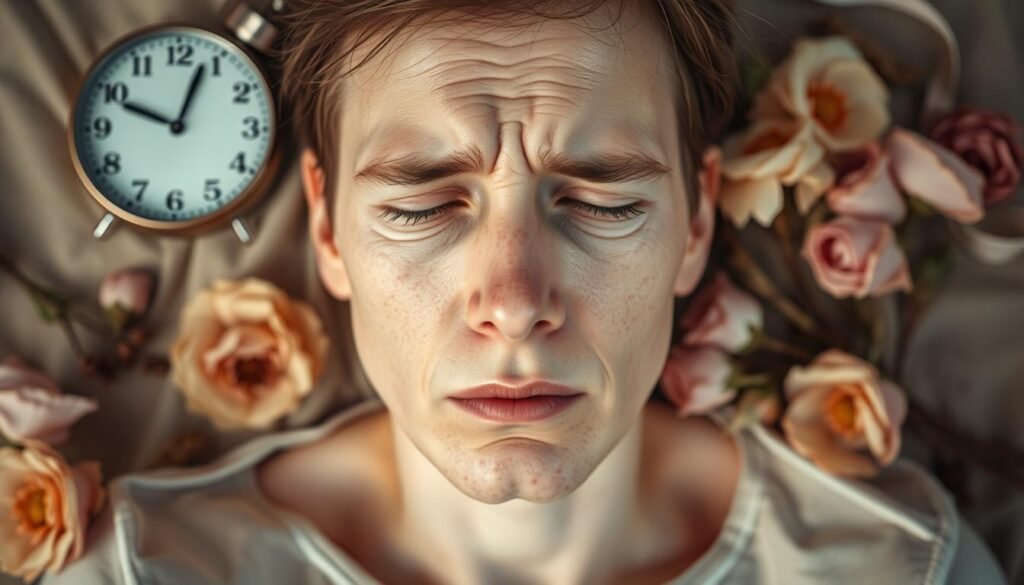Almost half of people struggle with sleep as they approach menopause. This fact highlights a major issue affecting many lives during this time. The journey through menopause changes health in various ways, particularly sleep.
Hormonal shifts can bring about several health problems. Issues like insomnia, mood swings, and more can arise. Understanding this link is key for those looking to better their life quality.
About 50% report sleep problems after menopause. Hormonal changes mess with sleep, causing issues like insomnia and restless legs syndrome. Night sweats can also wake you up, feeling anxious for several minutes.
Knowing about menopause and sleep lets people explore treatments. Options like hormone therapy and melatonin could help. For more on how hormones affect health, click here.
Key Takeaways
- Up to 46% of individuals experience sleep difficulties before menopause.
- Hormonal changes during menopause can significantly affect sleep quality.
- Conditions like sleep apnea and restless legs syndrome are prevalent during and after menopause.
- Night sweats are common symptoms that can lead to sleep disruption.
- Menopausal hormone therapy has been effective in improving sleep patterns.
- Melatonin supplements may alleviate sleep issues and improve mood.
- Understanding the connection between hormonal changes and sleep issues is essential for better health management.
Understanding Hormonal Changes
Hormonal changes are fluctuations in hormone levels in our bodies. They are caused by aging, stress, and life events like puberty, pregnancy, and menopause. These changes can greatly impact our health and well-being. Understanding them helps us know how they affect our daily life and health.
What Are Hormonal Changes?
Hormonal changes involve shifts in the body’s hormone system. This can change how hormones work with organs and tissues. These shifts often happen during key life phases. For instance, women go through big changes during their menstrual cycles, pregnancy, and menopause. They may feel different emotionally and physically. Hormone levels can also change because of stress, lifestyle, and the environment.
Impact of Hormonal Changes on Health
Health issues from hormonal changes can vary a lot. Common problems include sleep troubles, mood swings, and metabolic issues. For example:
- 30% of pregnant women struggle to get good sleep compared to 15% of all women.
- About 25% of women in perimenopause have poor sleep, with rates up to 60% in postmenopausal women. This shows how hormonal changes can lead to sleep problems.
- Women often have insomnia during hormonal changes. They might need different medicine doses than men because of metabolic differences.
This shows the strong impact of hormone levels on women’s health, especially during pregnancy and menopause.
| Life Stage | Common Symptoms | Health Impacts |
|---|---|---|
| Pregnancy | Fatigue, mood swings, sleep disturbances | Increased daytime sleepiness, poor sleep quality |
| Perimenopause | Hot flashes, anxiety, sleep problems | Higher incidence of insomnia, mood disorders |
| Menopause | Depression, fatigue, irritability | Increased risk of heart disease and metabolic syndrome |
Menopause and Its Effects
Menopause is an important change in a woman’s life. It brings symptoms due to big hormonal changes. The drop in estrogen and progesterone causes both body and emotional changes. These include hot flashes and night sweats. They can disrupt sleep, upset daily routines, and lessen life quality.
Common Symptoms of Menopause
During menopause, women face various symptoms. The most common ones are:
- Hot flashes, leading to sudden warmth and sweating
- Night sweats, making it hard to sleep well
- Irregular periods before menopause fully starts
- Changes in mood, like feeling irritable or anxious
These symptoms affect a woman’s everyday life and health. But, making changes in lifestyle can help manage these symptoms well.
Sleep Disturbances during Menopause
Many women, 40-60%, have trouble sleeping during menopause. This is often due to symptoms like hot flashes and night sweats. These make it hard to fall asleep or stay asleep.
Trying yoga or meditation can improve sleep. A cooler bedroom helps manage night sweats. The CDC suggests avoiding big meals before bed to sleep better.
Understanding these symptoms and implementing strategies can help. It makes this life stage easier to navigate for women.
The Role of Hormones in Sleep Disorders
Hormones play a key part in sleep disorders. They directly affect sleep quality and our health. By looking into their roles and how imbalances cause sleep issues, we can handle our sleep better.
Key Hormones Affecting Sleep Quality
Melatonin controls our sleep-wake cycle, increasing in the evening and peaking at night. This helps us sleep well. Cortisol, the stress hormone, increases at night and peaks in the morning. High cortisol levels from stress can mess up our sleep. Other important hormones include thyroid-stimulating hormone (TSH) and progesterone. TSH peaks at night, and low progesterone can cause insomnia and sleep apnea, which is common during and after menopause.
How Hormonal Imbalances Lead to Sleep Issues
Hormonal imbalances seriously affect sleep. They disrupt our body clock and melatonin production, leading to high cortisol levels. This can cause health problems like obesity and metabolic issues. High cortisol harms sleep by reducing REM sleep and leading to tiredness. Low testosterone and progesterone levels also hurt sleep quality. During menopause, women face more sleep issues due to hormonal changes. This includes more insomnia and sleep-breathing problems.
| Hormone | Role in Sleep | Effects of Imbalance |
|---|---|---|
| Melatonin | Regulates sleep-wake cycle; peaks at night | Insomnia, lower sleep quality |
| Cortisol | Increases during night; peaks in morning | Decreased REM, increased fatigue |
| TSH | Regulates metabolism; peaks in the night | Worsening sleep quality when elevated |
| Progesterone | Aids in sleep onset; levels drop during menopause | Insomnia, sleep apnea |
| Testosterone | Supports sleep stability; dips with stress | Poor sleep quality, fatigue |
Anemia: Causes and Symptoms
Anemia is when you don’t have enough healthy red blood cells. It can really impact your health. Not having enough iron is a common reason for it. This can happen if you don’t eat enough iron-rich foods, lose blood regularly, or have problems absorbing iron. Knowing about anemia’s types and symptoms is key to get help early.
Types of Anemia
There are many kinds of anemia, each caused by different things. The most common types include:
- Iron-deficiency anemia: This happens when iron levels are too low. It can come from your diet, periods, or bleeding in your stomach.
- Aplastic anemia: This is when the bone marrow can’t make enough blood cells. It might be due to immune system problems or toxic chemicals.
- Vitamin-deficiency anemia: Not having enough important vitamins, like B12 or folate, can cause this anemia.
- Hemolytic anemia: In this type, red blood cells are destroyed too early. This can cause different health problems.
Symptoms of Anemia in Adults
Spotting anemia signs is crucial for getting the right treatment. Common symptoms include:
- Fatigue and feeling weak
- Skin that’s pale or looks yellow
- Being short of breath, mainly when you move around a lot
- Feeling dizzy or like you might faint
- Having cold hands and feet
Symptoms can change depending on how bad the anemia is and what type you have. For example, if you lack iron, your nails might get brittle. Or you might crave things that aren’t food, a condition known as pica. Finding these signs early can help stop more serious problems later.

Sleep Apnea: A Common Sleep Disorder
Sleep apnea is a major sleep disorder marked by breaks in breathing at night. These breaks can last from a few seconds to minutes and happen many times while sleeping. Knowing about sleep apnea helps us understand its effects and how to prevent it.
Understanding Sleep Apnea
Obstructive sleep apnea (OSA) is the most common form, hitting 10% to 30% of U.S. adults. It happens when airways are blocked, cutting down oxygen to vital organs. Central sleep apnea (CSA) is rarer, affecting less than 1% of people, and involves the central nervous system.
Risk Factors for Sleep Apnea
Several risk factors make sleep apnea more likely:
- Gender and Age: Men or those assigned male at birth usually face a higher risk of OSA, especially in early adulthood.
- Body Structure: Traits like a larger tongue or smaller lower jaw can raise the risk.
- Body Mass Index: Higher BMI means a higher chance of getting OSA.
- Family History: Sleep disorders in the family can increase your risk.
- Respiratory Issues: Trouble breathing through the nose also raises OSA chances.
- Habits: Smoking and drinking a lot greatly increase the risk.
Understanding these risks can help people make better choices to lower the chance of getting sleep apnea and its health problems.
Common Health Conditions: Hormonal Changes, Anemia, Sleep Apnea, and More
Many health problems are linked to hormonal changes, anemia, and sleep apnea. These issues can be connected. For example, menopause can cause hot flashes and night sweats. These affect how well you sleep. Studies show 75 to 85 percent of women deal with these issues due to hormone shifts.
Anemia, often from not having enough iron, can worsen sleep disorder symptoms. Feeling very tired is a main sign of anemia. This can make good sleep hard to find. Women are more likely to get both anemia and sleep problems. They are almost twice as likely as men to have insomnia. This shows why we must treat these health issues together.
About 18 million people in the U.S. have sleep apnea. This problem can lead to heart disease and depression issues. It is more common in men. But, risks increase for women after menopause, especially with hormonal changes. A key sign of sleep apnea is snoring. This affects not just the person snoring but their partner too.
Knowing how these health issues are related can help people get better treatment. When you treat sleep apnea, hormonal changes, and anemia correctly, you can feel better. For more information on sleep apnea and its signs, visit this resource.

Acute vs. Chronic Fatigue
Fatigue comes in different forms, and knowing the difference is key. Chronic fatigue syndrome (CFS) is tough. It means being tired all the time without a clear reason. This problem touches millions, messing with their day-to-day life and happiness.
Identifying Chronic Fatigue Syndrome
Up to 2.5 million people in the U.S. might have CFS. Sadly, less than 20% get diagnosed quickly. Symptoms are hard to pin down. More women get CFS than men, about four to one. It usually hits between 40 and 60, but young people get it too.
Relationship Between Fatigue and Sleep Disorders
Chronic fatigue and sleep issues are closely linked. Those with CFS often can’t sleep well, making them more tired. Problems like bad sleep or sleep apnea make things worse. Nearly half can’t work, and most feel their absolute worst.
The Link Between Stress and Hormonal Imbalances
Long-term stress can mess with how our hormones are made, leading to health problems. Too much cortisol, which goes up when we’re stressed, can make other hormones act up. This can cause mood swings, trouble sleeping, and changes in metabolism.
How Stress Affects Hormone Production
Being stressed for a while makes the body produce more cortisol. This can mess with hormones that control things like appetite and mood. It’s important to manage stress well to keep hormone levels healthy.
Managing Stress for Better Health
Good stress management can get hormone levels back to normal. Practices like meditation and yoga help lower stress. Exercise is also great for keeping hormones in check. It’s key to get help if stress gets too much to handle on your own.
Knowing how stress and health are linked helps us stay stronger when faced with stress. This is very important for avoiding sleep issues like those sleep troubles caused by anemia, according to this detailed analysis.

Hot Flashes and Night Sweats
Many people going through menopause experience hot flashes and night sweats. These symptoms are mainly due to hormonal changes. They cause a lot of discomfort and can ruin a good night’s sleep. Knowing why hot flashes occur helps in finding the right ways to handle them.
Causes of Hot Flashes
Hot flashes happen when your body can’t keep its temperature steady. This is often because of changes in estrogen levels. Each hot flash can last for a few minutes. You might feel very warm, sweat a lot, and feel anxious. Stress, certain meds, or conditions like hyperthyroidism can also cause them.
Up to 85% of women in perimenopause and menopause get hot flashes. It’s important to understand what they are. This knowledge helps in managing them better.
Sleep Disruption Due to Night Sweats
Night sweats often go hand in hand with hot flashes and mess with sleep. About 41% of patients in primary care say they have trouble sleeping because of them. People between 41 to 55 years old, especially women nearing menopause, are more likely to have sleep problems.
Sleep issues can make you feel more tired and moody. Hormonal changes, stress, and other medical issues can cause night sweats. But, treatments like hormone therapy and changing your lifestyle can really improve your sleep.
Mood Swings: Hormonal Influence
Mood swings can be tough, especially during hormonal shifts. These fluctuations often happen during the menstrual cycle, pregnancy, or menopause. They can really impact a person’s mental state. It’s important to understand these mood changes to manage them well.
Understanding Mood Changes
Hormonal shifts can make you feel irritable, sad, or anxious. They are linked to changes in hormones like estrogen and progesterone. Knowing that these mood swings are usually temporary helps. Adopting healthy habits, like a good diet and regular exercise, can ease the emotional stress.
Impact of Hormonal Fluctuations on Mood
The link between hormonal shifts and mood swings is clear. Studies show women often face stronger mood changes than men during hormonal shifts. This showcases the need to pay attention to mood swings for mental health. If symptoms are severe, getting professional help is important. For managing these changes, resources on sleep habits during hormonal changes and adrenal health can be very helpful.
Treatment Options for Hormonal Imbalances
To tackle hormonal imbalances, a detailed plan is key. This includes life changes and medical options. Such a plan is tailored for each person’s unique situation. It helps them reach their hormone health goals.
Lifestyle Changes for Better Hormone Health
Making good lifestyle changes can really help with hormone issues. Here are some important steps to take:
- Regular Exercise: Physical activity fixes hormone issues and helps with weight control. This is crucial for those with PCOS.
- Balanced Nutrition: A diet focused on whole foods and healthy fats stabilizes blood sugar. It also keeps hormones in check.
- Stress Management: Using yoga or meditation can fight stress, a common cause of hormone problems.
- Quality Sleep: Getting enough sleep is key for balanced hormones. Lack of sleep makes hormone issues worse.
- Reducing Toxin Exposure: Cutting down on toxins and improving gut health can boost hormone health.
Medications and Therapies Available
Sometimes, lifestyle changes aren’t enough, especially for serious issues. Medical treatments then become crucial:
- Hormone Replacement Therapy (HRT): HRT can make menopause easier and balance hormone levels in women.
- Contraceptives: Birth control pills regulate menstrual cycles and help with hormone disorders like PCOS.
- Metformin: This is used for those with insulin issues, mainly in people with PCOS.
- Natural Supplements: Some find relief in natural remedies that support hormone health.
- Surgery: Sometimes, surgery is the only way to fix hormone problems.
| Treatment Option | Description | Benefit |
|---|---|---|
| Regular Exercise | A routine of physical activities. | Helps in weight management and improves hormone regulation. |
| Hormone Replacement Therapy | Medical therapy to replace hormones that the body no longer makes. | Alleviates symptoms associated with menopause. |
| Balanced Nutrition | A diet rich in whole foods and nutrients. | Supports glucose control and hormone health. |
| Stress Management Techniques | Methods to reduce stress, like meditation and yoga. | Promotes emotional balance and regulates hormone production. |
| Medications like Metformin | A prescription drug that improves insulin sensitivity. | Helps manage symptoms of PCOS and reduces diabetes risk. |
Conclusion
Understanding different health issues is very important for women dealing with hormonal changes, sleep problems, and anemia. It helps to know the symptoms of these conditions. This way, individuals can work on getting better overall.
Lifestyle, stress management, and regular doctor visits are key to tackle these health issues. They help improve well-being significantly.
Knowing the early signs of hormonal imbalances is vital. It allows for quick action, lessening their effect on daily life. Eating better and sleeping enough are crucial. They help manage energy and tackle health problems. Being informed allows women to get the help and treatment they need.
For tips on addressing sudden fatigue, check out this detailed guide. A deeper understanding of your health leads to a more active and lively lifestyle. It shows how important it is to consider all aspects of health together.